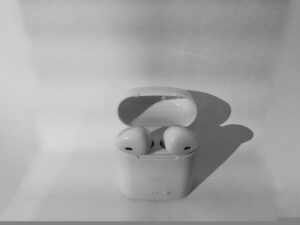AudioReputation is reader-supported. When you buy through links on our site, we may earn an affiliate commission Learn More
This guide explores some of the best fixes for issues when your Airpods won’t connect. If you’re having difficulty connecting your Airpods to your phone or laptop, then there are a few areas to check. Often the fix is super easy!
Airpods are the latest popular wireless headphones from Apple, and whilst they are widely known to be fantastic, you may find yourself running into connection issues.
Keep reading for my full recommendations of solutions.
Also Read: Top 6 Loudest Wireless Earbuds In 2022
Table of Contents
- Are your AirPods broken?
- List of 11 most common issues and fixes with AirPods connectivity
- Power off your iPhone, and turn it on again
- Double-check Bluetooth in the phone settings
- Update your phone
- Set up the AirPods in your iPhone (or check pairing)
- AirPods need charging
- The AirPods case needs charging.
- Set the AirPods to pairing mode
- Connect the AirPods to a different device.
- Check your AirPods aren’t connected to a different device
- Make sure the AirPods are in range, with no barriers
- Clean the AirPods and Charging Case
- What to do if your AirPods won’t connect even after trying all the above?
- FAQs
- Final Note
Are your AirPods broken?

Without proper diagnosis, you won’t be able to tell at this stage. You will need to do a thorough round of testing to find out whether your AirPods are completely broken.
If you are having difficulty connecting other pairs of headphones to your iPhone, it may mean your phone itself may be damaged rather than your headphones. Even if you replace your AirPods with a fresh set, if your iPhone has a hardware or software issue, you may have the same issue. Our tutorial will assist you in identifying the true cause of the issue, letting you either fix the connection issue or determine that your Airpods are broken.
AirPods aren’t your typical Bluetooth headphones. Apple constructed the AirPods using unique electronics with built-in motion sensors and other technologies that enable your iPhone to use all of the new AirPods functions. This makes them vulnerable to a range of issues, which may be harder to fix than other generic headphones.
List of 11 most common issues and fixes with AirPods connectivity
Power off your iPhone, and turn it on again

It’s the classic tech support solution. “Have you tried turning it off and on again?” Sometimes resetting your phone fixes the connection issue. It may be some kind of hardware or software glitch that just needs a reboot to correct. Other times it’s due to a build-up of background programs that may be taking up all the memory and power.
To reboot your phone, follow these steps.
- Hold down the power button.
- Select “power off”.
- Wait until the phone powers down.
- Turn the phone on again.
- Try to re-connect the headphones.
Double-check Bluetooth in the phone settings
![]()
It might seem obvious to some, but you should at least check that your phone has its Bluetooth connection on, and isn’t accidentally paired to another Bluetooth device.
- Open the Settings of your phone.
- Navigate to the Bluetooth section.
- Make sure Bluetooth is enabled.
- Check to see if the phone isn’t connected to a different Bluetooth Device
On some phones, you can use the smart assistant to enable Bluetooth, for example, “Hey Siri, Turn Bluetooth On”
Update your phone

If the connection is due to a software bug, it may be time to update your phone’s software. Software updates often help to correct issues like this, although it might not always be the solution. In any case, it’s always a good idea to keep your phone up to date.
- Open the phone settings.
- Navigate to Software Updates.
- Tap “Check for Updates.
- If there is an update available, select the installation.
- After installing, try to reconnect your AirPods.
Set up the AirPods in your iPhone (or check pairing)

If it’s the first time using your AirPods with your iPhone (or another device), you will need to do the initial setup/pairing.
- Unlock your device
- Open the AirPods case (with earbuds inside) next to your phone
- Make sure Bluetooth is enabled on the phone
- On iPhone, a setup animation should appear.
- On other devices, you will need to enter Pairing Mode in the Bluetooth settings, then choose the AirPods as a new device.
AirPods need charging

This is also a simple oversight, but you need to make sure the AirPods themselves are charged; otherwise, they won’t be noticed by the phone.
- Place the AirPods into their charging case.
- The status light will display the amount of charge the AirPods have.
- When the status light turns green, it indicates they have been charged to the max.
The AirPods case needs charging.

The AirPods case itself also needs to be charged; otherwise, when you put the AirPods in, there is no energy to power the charging process. You can see the level of charge the case has by removing the AirPods and checking the status light.
- Remove the AirPods (optional)
- Plug a lighting cable into the case’s charging port.
- Wait until the case’s status light turns green.
- This means the case is fully charged and will be able to charge the AirPods themselves.
If there is a flashing amber light, it means the case is still charging
Set the AirPods to pairing mode
You also need to make sure your AirPods have been in pairing mode, so they connect with the phone; this is usually only needed the first time you use them; however, sometimes, they become unpaired due to a glitch.
- Insert the AirPods into their case.
- Open the lid of the charging case.
- Find the setup button on the back of the charging case.
- Press and hold the button on the back until the status light flashes white.
- The flashing light indicates the AirPods are in pairing mode and should be detectable by other Bluetooth devices.
Also Read:Bluetooth Multipoint Pairing Explained
Connect the AirPods to a different device.

To test if the issue is with the AirPods or your transmission device, you should connect the pods to a second device for testing.
- Disable Bluetooth on the original device
- Enable Bluetooth on the second device. This could be a laptop or your friend’s phone etc.
- Activate the pairing mode, and check to see if you can connect the AirPods to the second device.
If they do connect, this means the issue is probably to do with your phone rather than the AirPods themself. This means you may need to reset your phone or check its Bluetooth settings in more detail.
Check your AirPods aren’t connected to a different device
This is another simple oversight. But if your AirPods are already connected to a different device, then they won’t be seen by your main phone. This would cause me an issue when I would share my headphones with my girlfriend, and they would connect to her phone first, so they wouldn’t appear on my phone.
Check any other devices you have connected them to, and make sure you turn their Bluetooth off; you can even forget the pairing. Then try to reconnect the AirPods to your main device. If this doesn’t work, you may need to reset the AirPods or your other device.
Make sure the AirPods are in range, with no barriers

The recommended max range of the AirPods connection is between 30 and 60 ft. Beyond this range, you may experience difficulties connecting.
A further issue comes from any barriers between the phone and headphones. This can interfere with the Bluetooth signal, making it hard to connect.
I always recommend keeping your headphones as close to the phone as possible; this ensures the connection is clean and uninterrupted.
Clean the AirPods and Charging Case
If the charging terminals in either the case or the headphones themselves become dirty, it can interfere with the charging process. This means the AirPods won’t charge when in their case, so they will eventually run out of battery and won’t power up. This is a common issue for AirPods that have been owned for a while, particularly if you keep the case in your pocket a lot, as there is an extra build-up of fluff.
Cleaning the case and AirPods is an easy task.
- Using a lint-free soft close, wipe the terminals of the AirPods and the case.
- Make sure you scrape out any fluff that could block the charging terminals from connecting with each other.
What to do if your AirPods won’t connect even after trying all the above?
Even if you’ve tried all of the above solutions and you are still not having any luck, then your Airpods or iPhone may have some serious issues. There are only a couple of solutions here.
First, test out the connection with other headphones. This indicates whether the issue is with the Airpods or the iPhone itself. Based on what is broken, check how long you have left on your manufacturer’s warranty. If it’s covered, then you should be able to send them off to get fixed or replaced. Otherwise, I’m afraid you’re going to have to buy new headphones (or an iPhone).
Make an Appointment with the Genius Bar

Apple offers support in their stores to troubleshoot and fix your products. Simply book an appointment, stating the issue. They should be able to test the problem, hopefully fixing it there for you. Otherwise, they can recommend a service to replace or fix any hardware of software faults.
Alternatively, you can use the Apple Mail-In Service to send your product in for repair.
Related: How to Connect Wireless Speakers to a Receiver?
FAQs
AirPods won’t connect after reset.
If you try resetting both your AirPods and your phone/laptop, and you are still having no luck with the connection, then check out some of the other solutions. There are several areas where issues could arise, and sometimes a reboot isn’t enough. Check out the above list for more instructions!
How to connect AirPods?
Connecting AirPods is super easy. Simply power on the headphones and your phone. Enable Bluetooth in your phone settings. Hold the button on the back of the AirPods charging case to enter pairing mode. In your phone’s Bluetooth settings, you should now see the AirPods available to connect. Select them, and voila! You are now connected and ready to enjoy.
AirPods won’t connect to Mac.
If your AirPods won’t connect to your Mac, this could be due to a range of issues. I suggest you read the above solutions. Whilst it is written for phones, the same processes apply to Macs and computers!
Final Note
Good luck finding and fixing the issue! This guide outlines most of the common problems. If none of the above solutions work for you, then I recommend you speak to Apple for help. They will be able to sort everything out.

Hello, my name is James Longman.
I’m a writer and editor at AudioReputation. I disassembled my first portable AM/FM radio when I was only 8. At the age of 11, I burned the circuit board on my old boombox cassette player. I’m not going to explain how but it was reckless and stupid.
Since then, I have become much more careful around radios, boomboxes, and other audio devices (at least, I like to think so) but I have never lost the passion for audio equipment. Throughout 20 years of my professional career, I’ve been working for various audio equipment manufacturers and even started building speakers on my own in my little workshop.
I love the work we do here at AudioReputation. Testing, comparing, and evaluating all kinds of audio devices (speakers, soundbars, headphones, home theater systems, etc.) is something I truly enjoy. I try to be unbiased and give you my honest opinion on every piece of equipment I test. Still, you should take my reviews with a pinch of salt and always be just a little bit skeptical. The fact that I liked some speaker or soundbar doesn’t mean that you are going to love it. If you have the opportunity, you should test it/hear it before buying it.

